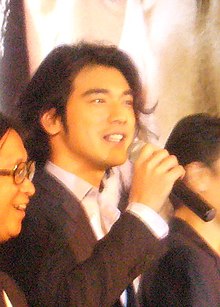Takeshi Kaneshiro
| Takeshi Kaneshiro | |
|---|---|
 |
|
| Background information | |
| Chinese name | 金诚武 |
| Pinyin | Jīnchéng Wǔ (Mandarin) |
| Jyutping | Gam1sing4 Mou5 (Cantonese) |
| Pe̍h-ōe-jī | Kim-siânn Bú (Hokkien) |
| Birth name | Kaneshiro Takeshi |
| Born |
October 11, 1973 Taipei, Taiwan |
| Nationality | Japan |
| Other name(s) | Aniki |
| Occupation | Actor, singer |
| Genre(s) | Mandopop, Cantopop |
| Instrument(s) | Vocals, guitar |
| Years active | 1992–present |
| Ancestry | Okinawan, Taiwanese |
Takeshi Kaneshiro (Japanese, Okinawan and Chinese: 金城 武, romaji: Kaneshiro Takeshi, Pinyin: Jīnchéng Wǔ, pronounced [tɕíntʂ͡ʰə̌ŋ ù], born October 11, 1973) is a Taiwanese-Japanese actor and singer.
Kaneshiro is a common Okinawan name. In kanji, 金城 is Kaneshiro and 武 is Takeshi (given name), with Japanese readings. He appears as 金城 武 (Kaneshiro Takeshi) in Japanese media.
Since personal names are commonly written in Chinese characters in both Chinese and Japanese naming conventions, with surnames before given names, and the name sounds native in both Japanese and Chinese, this gives Kaneshiro the freedom whether to distinguish himself as a Japanese or not when working in Chinese-speaking countries by preserving or removing the space between his surname and given name.
Kaneshiro's mother is Taiwanese and his father is from Okinawa, Japan. He was born and raised in Taipei but also holds Japanese citizenship.
The son of a Japanese businessman and a Taiwanese homemaker, he has two elder brothers; one is his senior by seven years, the other just by one. After graduating from Taipei Japanese Junior High School, he enrolled at English-based Taipei American School, which enabled him to converse in English. While he was studying there, he began doing television commercials and decided to quit school to pursue a singing and acting career. He is multilingual, fluent in Mandarin, Taiwanese Hokkien, Japanese, Cantonese, and to lesser degrees in English.
In 1992, Kaneshiro made his singing debut, entering the business with the nickname Aniki, meaning 'older brother' in Japanese. His debut album was Heartbreaking Night (1992). Contracted to EMI, he wrote many of his own Mandarin and Cantonese songs. The following year, his popularity propelled him into acting and he no longer produces any commercial music.
...
Wikipedia
